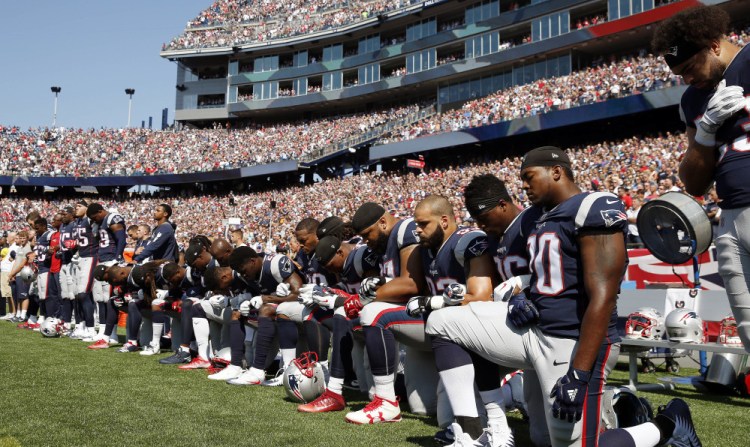Some stood. Some kneeled. Some remained in the locker room, choosing to speak through their absence from the NFL’s pregame ceremonies, in which the American flag is displayed and the national anthem sung. But from London to Los Angeles, virtually all NFL players on the sidelines prior to kickoff of Sunday’s slate of 14 games locked arms with each other in response to President Donald Trump’s three-day campaign demanding that team owners “fire or suspend” players who kneel during the national anthem and calling on fans to boycott games if the form of protest continued.
The silent rebuke to the president, determined independently by each of the 28 NFL teams in action Sunday, represented an unprecedented collective action and show of solidarity among players who battle against one another 16 weeks, some more, each season.
Some, such as the Jacksonville Jaguars and Philadelphia Eagles, were joined on the sideline by their team owners, Shahid Khan and Jeffrey Lurie, respectively. Most were joined in standing shoulder-to-shoulder by coaches, staff and, in some cases, police officers.
All but five of the NFL’s 32 team owners and CEOs issued statements Saturday night and into Sunday morning in response to Trump’s crusade against protesting NFL players, which began in earnest during a Friday night rally in Alabama. After making a thinly veiled allusion to former San Francisco 49ers quarterback Colin Kaepernick, who sparked a national debate by taking a knee during August 2016 preseason games to protest police violence against minorities, Trump called on NFL coaches to get the “son of a bitch” players off the field if they continued to kneel. The president repeated his call with no less intensity on Twitter on Saturday and Sunday morning.
The tenor and substance of those remarks, along with criticism that NFL rule-changes for safety’s sake had made the game boring, triggered reactions from many players, coaches and executives. While far from universally in favor of Kaepernick’s method of protest, many owners issued statements defending the rights of players – and all Americans – to express themselves on matters they are passionate about.
Among the more notable was New England Patriots owner Robert Kraft, a vocal Trump supporter and a $1 million donor to his inaugural.
“There is no greater unifier in this country than sports and, unfortunately, nothing more divisive than politics,” Kraft wrote in his statement released Sunday morning. “I think our political leaders could learn a lot from the lessons of teamwork and the importance of working together toward a common goal.”
NFL game day began in London’s Wembley Stadium, where the Baltimore Ravens and Jacksonville Jaguars kicked off at 9:30 a.m. ET, following two early morning tweets in which Trump reiterated his objections to anthem protesters and seemed to encourage fans who agreed with him to stop attending games.
Before the morning’s first game, Ravens and Jaguars players and coaches locked arms on the sideline – some kneeling, others standing – as the anthem played. It was a scene repeated in 13 other stadiums stateside, from Foxborough Stadium in Massachusetts to StubHub Center in the Los Angeles suburbs.
Trump reacted to the showings by tweeting at 2:20 p.m., “Great solidarity for our National Anthem and for our Country. Standing with locked arms is good, kneeling is not acceptable. Bad ratings!”
Some NFL fans agreed with the president. At Foxborough, some booed the gestures while others chanted, “Stand up.” Similar dissent was heard in Buffalo, where boos rained down from some segments of the stadium as members of the Denver Broncos took knees.
Just about the time the NFL’s 4 p.m. games were kicking off, Trump addressed the matter with reporters as he left Bedminster, New Jersey. “I think the owners should do something about it. It’s very disrespectful to our flag and our country.”
He bristled at the suggestion that his comments had inflamed racial tensions, saying, “I’ve never said anything about race. This has nothing to do with race or anything else. This has to do with respect for our country, and respect for our flag.”
He also denied that he wants his supporters to boycott the NFL.
“No, no, no – I don’t,” Trump told reporters after returning to the White House on Sunday evening. “They can do whatever they want.”
However, the nonprofit group America First Policies launched a Facebook ad Sunday urging supporters to stand with the president by turning off NFL games. The online ad features an image of Trump with his hand over his heart and the hash tag “#TakeAStandNotAKnee.”
It was Trump’s campaign-style rhetoric that gave new life to what had become an isolated, almost passe form of protest. Speaking to supporters in Alabama on Friday night, he decried Kaepernick and later assailed rules meant to improve player safety, saying they hurt the game’s entertainment value and pointing to declining television ratings for NFL games.
What makes Sunday’s mass demonstrations by NFL players particularly notable is that the league demands conformity far more than other pro sports leagues, devoting lengthy sections of its rulebook to the height of players’ socks, for example. Players are most prized for executing assignments precisely as directed, and because NFL careers are short and contracts aren’t guaranteed – unlike those of NBA or Major League Baseball players – outspoken players who create distractions often do so at their peril.
Send questions/comments to the editors.


